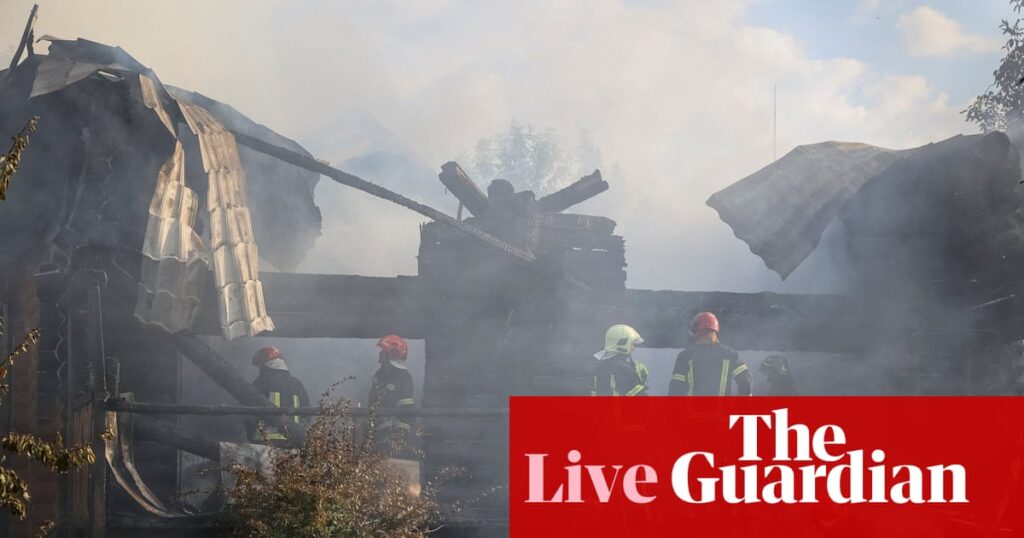Ukraine wants to get more details on security guarantees in ‘7-10 days’
Zelenskyy also told reporters that he would want to see an agreement on security guarantees for Ukraine before meeting Russia’s Vladimir Putin, AFP said.
He warned that in the meantime both sides were preparing for further fighting, with Russia building up troops on the southern frontline and Ukraine test launching a new long-range cruise missile.
“We want to have an understanding of the security guarantees architecture within seven to 10 days,” Zelensky said, in comments to reporters released for publication Thursday.
“We need to understand which country will be ready to do what at each specific moment,” he said. A group of allies led by Britain and France are putting together a military coalition to support the guarantees.
Zelenskyy also indicated his preference on where the meeting could take place, calling for a “neutral” European country.
“Switzerland, Austria – we agree… For us, Turkey is a Nato country and part of Europe. And we are not opposed,” Zelensky said of possible venues.
Key events
Ukrainian man arrested over Nord Stream pipeline attack, German prosecutors say
In other news, Italian police have arrested a Ukrainian man suspected of coordinating the attacks on the Nord Stream pipelines, Germany’s prosecutor general said, adding that he would be brought before a German judge after being transferred, Reuters reported.
The suspect, identified only as Serhii K. under German privacy laws, was part of a group of people who planted devices on the pipelines near the German island of Bornholm in September 2022, a statement from the prosecutor’s office said.
The prosecutor’s office allege that the man and his accomplices had set off from Rostock on Germany’s north-eastern coast in a sailing yacht to carry out the attack, adding that the vessel had been rented from a German company with the help of forged identity documents via middlemen.
Carabinieri officers arrested the suspect overnight in the province of Rimini on Italy’s Adriatic coast, the German prosecutors’ statement said.
Reuters noted that no one has ever taken responsibility for explosions that severely damaged pipelines carrying gas from Russia to Europe in September 2022, marking a major escalation in the Ukraine conflict and ramping up an energy supply crisis on the continent.
Lavrov blames Ukraine, Coalition of the Willing for no progress in peace talks
Meanwhile, Russian foreign minister Sergei Lavrov has been speaking in the last few minutes, shifting blame for little progress onto Ukraine.
In comments, reported by Reuters, he claimed without offering evidence that Ukraine wanted to “undermine Trump’s efforts to resolve conflict,” and insisted that Russia “was already ready for an honest talk about security guarantees,” but along the lines of its maximalist 2022 proposal.
Lavrov even appeared to question Zelenskyy’s legitimacy to sign any deal, saying that “when it comes to signing something, the issues of legitimate of the Ukrainian representative will have to be resolved.”
He also criticised the “Coalition of the Willing,” saying they wanted to “shift the focus away from resolving the root causes of the conflict,” and saying that he hoped “such European adventurism fails.”
Ukraine wants to get more details on security guarantees in ‘7-10 days’
Zelenskyy also told reporters that he would want to see an agreement on security guarantees for Ukraine before meeting Russia’s Vladimir Putin, AFP said.
He warned that in the meantime both sides were preparing for further fighting, with Russia building up troops on the southern frontline and Ukraine test launching a new long-range cruise missile.
“We want to have an understanding of the security guarantees architecture within seven to 10 days,” Zelensky said, in comments to reporters released for publication Thursday.
“We need to understand which country will be ready to do what at each specific moment,” he said. A group of allies led by Britain and France are putting together a military coalition to support the guarantees.
Zelenskyy also indicated his preference on where the meeting could take place, calling for a “neutral” European country.
“Switzerland, Austria – we agree… For us, Turkey is a Nato country and part of Europe. And we are not opposed,” Zelensky said of possible venues.
Zelenskyy says he asked Trump to get Hungary to drop its opposition to Ukraine’s EU accession
We are also getting more details from Zelenskyy’s comments to a group of reporters, via agencies.
The Ukrainian president revealed that during his meeting with Donald Trump on Monday, he asked the US leader to pressure Hungary into dropping its veto on Kyiv’s bid to join the EU, AFP reported.
“It is absolutely fair that Ukraine wants to join the European Union… This is our sovereign right,” Zelensky told reporters.
“President Trump promised that his team would work on this,” he said.
Bloomberg reported yesterday (£) that Trump indeed called Hungary’s Viktor Orbán later to discuss the issue.
Drone that fell in Poland ‘probably’ came from Belarus, prosecutor says
If you followed the blog on Wednesday, you know we looked at an incident with an allegedly Russian drone that crossed into Poland and exploded in a cornfield, some 100 km from Polish-Belarusian border.
A regional prosecutor issued an update today, saying that “there is a very high probability … that the object probably came from Belarus.”
That marks a slight shift of tone, as on Wednesday officials claimed the drone was launched from Russia.
But deputy foreign minister Marcin Bosacki said this morning that a protest note would be given to Russia later today, Reuters reported.
European leaders scrambled to shield Ukraine in high-stakes Trump talks – but did they?

Ashifa Kassam
European community affairs correspondent
Days after the unprecedented flurry of diplomacy, questions continue to swirl over what – if anything – might come out of it. On Monday, Trump and several European leaders, said Putin had agreed to face-to-face talks with Zelenskyy in the coming weeks.
Moscow, however, has yet to confirm that any such meeting – which would be the first since Russia launched its full invasion of Ukraine more than three years ago – is being planned, with a Kremlin aide saying only that Putin and Trump discussed the idea of “raising the level of representatives” in the Ukraine talks.
Trump had also indicated a willingness to be part of security guarantees for Kyiv if there was a deal to end fighting. But the exact nature of those guarantees remains to be seen, with Trump later ruling out the possibility of the US putting troops on the ground in Ukraine and instead floating that Washington could provide air support.
Concerns also continue to linger over what exactly Trump proposed in Alaska and what, if anything, Putin agreed to during the near three-hour meeting. As Pjotr Sauer, a Guardian Russian affairs reporter, noted, some fear Trump may have overstated the outcome and misjudged Moscow’s willingness to compromise.
‘Let’s first hear what Russia is willing to do,’ Zelenskyy says on territorial concessions
In further comments from Zelenskyy this morning, reported by Reuters, he said it was unclear what concessions regarding territory Moscow was willing to make to end the war.
Trump has previously said Kyiv and Moscow will both need to cede land.
“To discuss what Ukraine is willing to do, let’s first hear what Russia is willing to do,” Zelenskiy said. “We do not know that.“
Morning opening: More questions than answers

Jakub Krupa
Three days on from the White House summit on Ukraine, the signals are no longer as positive as US president Donald Trump would have wanted us to believe.
Overnight, Politico reported that the US undersecretary of defence for policy, Elbridge Colby, told European allies that the US would only offer minimal guarantees for Ukraine, with most burden left for Europe to pick up.
A Nato diplomat briefered on the talks told Politico: “The US is not fully committed to anything.”
Any prospects of making further diplomatic progress also appeared to have stalled, with numerous Russian officials and diplomats toning down the expectations for both ceasefire and a potential Zelenskyy-Putin meeting.
Russia’s foreign minister Sergei Lavrov said that any meeting would need to be prepared “with the utmost care”, while the country’s deputy representative to the UN, Dmitry Polansky, told the BBC that “it shouldn’t be a meeting for the sake of a meeting.”
Or to translate to plain English: thanks but no, thanks.
Ukraine’s Volodymyr Zelenskyy responded to these stalling tactics this morning, calling for a “strong reaction” from the US if Putin refuses to meet him, as discussed with Trump.
The Ukrainian president also appeared to play down the prospect of the Hungarian capital, Budapest, hosting the potential summit with Putin, calling it “challenging.”
Hungary has long been Russia’s loudest advocate within the European Union, often looking to delay or block the sanctions, and criticising Kyiv and other capitals for their approach to the war. Budapest is also blocking Ukraine’s accession process to the EU.
Zelenskyy also pointed out another round of Russian attacks overnight, including against an American enterprise in Zakarpatia region, which injured 15 people.
He said the attacks were “as if nothing had changed at all.”
“A response is needed to this. There is still no signal from Moscow that they are really going to go into meaningful negotiations and end this war. Pressure is needed. Strong sanctions, strong tariffs.”
I will bring you all the key updates here.
It’s Thursday, 21 August 2025, it’s Jakub Krupa here, and this is Europe Live.
Good morning.

